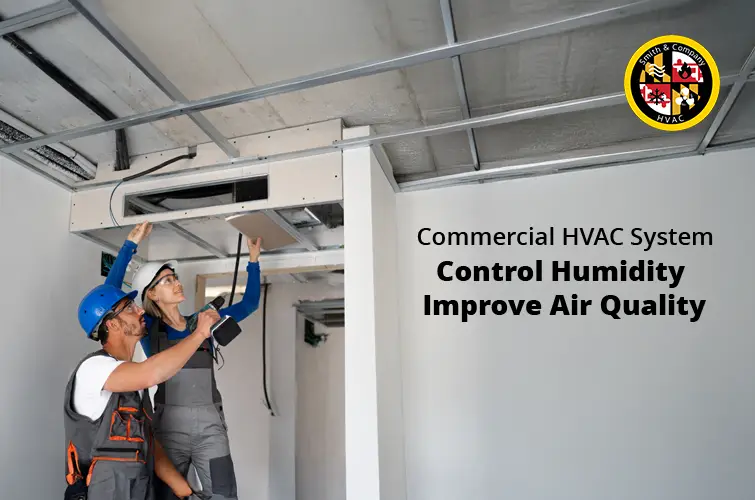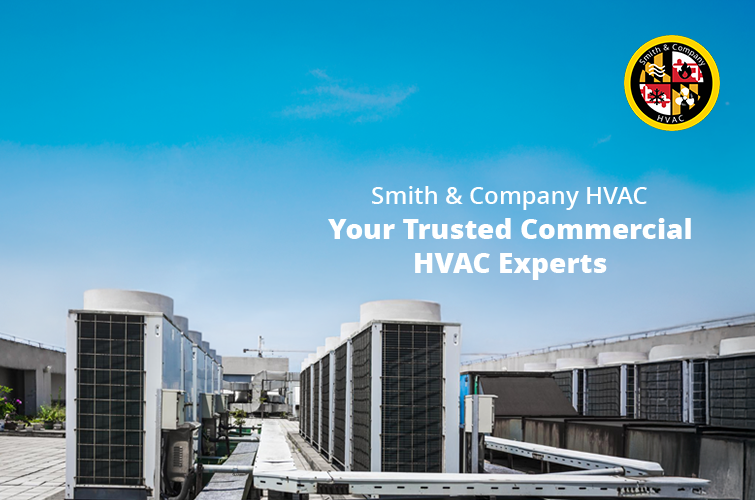
Indoor air quality plays a crucial role in enhancing workplace comfort, promoting employee health, and improving overall productivity. Poor air circulation and excess humidity can create an uncomfortable environment, leading to health issues, mold growth, and higher energy costs.
According to the EPA, indoor air can be two to five times more polluted than outdoor air. High humidity levels exacerbate the problem by trapping airborne contaminants and promoting the growth of mold and mildew. Businesses that struggle with musty air, condensation, or fluctuating temperatures often have HVAC systems that need adjustments or upgrades.
A well-maintained commercial HVAC system does more than heat and cool a building. It helps regulate moisture levels, filters out pollutants, and ensures proper air circulation. Investing in a high-quality system ensures that employees and customers remain comfortable while reducing energy expenses.
How Humidity Affects Your Commercial Space
Humidity control is essential for any commercial building. When indoor moisture levels rise above 50%, problems begin to emerge. Excessive humidity can lead to the growth of mold and mildew, which can damage walls, ceilings, and flooring. This creates health risks, particularly for employees with respiratory conditions such as asthma or allergies.
High humidity also makes indoor spaces feel warmer than they actually are. This often causes employees to lower the thermostat, leading to higher cooling costs and unnecessary strain on the HVAC system. Over time, this extra load can shorten the lifespan of the equipment, resulting in costly repairs or replacements.
A properly functioning HVAC system helps maintain optimal humidity levels between 30-50%, creating a comfortable and healthy indoor environment.
How a Commercial HVAC System Controls Humidity and Air Quality
A commercial HVAC system plays a vital role in regulating moisture levels and improving air quality. It does this through dehumidification, ventilation, and air filtration.
Dehumidification Through Cooling Cycles
One of the main ways an HVAC system removes excess moisture is through its cooling cycles. As warm air passes over the evaporator coils, moisture condenses into water and drains away. This natural dehumidification process helps maintain balanced humidity levels.
However, if humidity levels remain high, the HVAC system may not be working efficiently. In some cases, an oversized unit cools the air too quickly without running long enough to dehumidify properly. Dirty evaporator coils or clogged condensate drains can also reduce the efficiency of moisture removal. Regular HVAC maintenance ensures the system operates at peak performance.
Air Filtration and Ventilation Improvements
Indoor air pollution is another major concern for commercial spaces. Dust, allergens, bacteria, and volatile organic compounds (VOCs) can accumulate over time, affecting the health and well-being of everyone in the building.
Modern HVAC systems use high-efficiency filters to trap contaminants before they circulate through the air. Upgrading to HEPA or MERV-rated filters enhances filtration, removing even the smallest airborne particles.
Ventilation also plays a key role in maintaining indoor air quality. Without proper airflow, pollutants accumulate, resulting in stuffy air and unpleasant odors. Energy recovery ventilators (ERVs) help bring in fresh air from outside while expelling stale air, improving overall circulation without increasing energy costs.
Smart HVAC Controls and Humidity Sensors
Advanced smart thermostats now come equipped with humidity sensors, enabling businesses to monitor and adjust moisture levels in real time. These systems automatically regulate airflow and cooling cycles to prevent excess humidity.
For commercial buildings in high-humidity regions, upgrading to an HVAC system with built-in dehumidification features can make a significant difference. Businesses that frequently deal with moisture problems should consider integrating these solutions to maintain a balanced indoor climate.
Signs Your HVAC System Isn’t Managing Humidity Effectively
If your building experiences persistent humidity issues, your HVAC system may not be functioning optimally. Some warning signs include:
- Musty or damp odors lingering in different areas of the building.
- Condensation on windows and walls, indicating excess moisture in the air.
- Uneven cooling, where some rooms feel warmer or more humid than others.
- Increased allergy symptoms among employees, caused by mold and airborne pollutants.
- Higher-than-normal energy bills, suggesting the system is working harder than necessary.
Regular HVAC maintenance helps detect these issues before they lead to costly damage or health concerns.
The Benefits of an Efficient Commercial HVAC System
A well-maintained commercial HVAC system does more than just control temperature. It enhances air quality, improves comfort, and lowers operational costs.
Lower Energy Bills
When humidity levels are properly regulated, there’s less need for excessive cooling. This means the HVAC system doesn’t have to work as hard, resulting in reduced energy consumption and lower monthly utility bills.
Healthier Work Environment
Cleaner air leads to fewer sick days and better productivity. Employees and customers breathe easier when pollutants and allergens are filtered out, reducing respiratory problems and discomfort.
Longer HVAC System Lifespan
When an HVAC system doesn’t have to overcompensate for humidity issues, it experiences less wear and tear. Routine commercial HVAC services extend the life of critical components, preventing costly breakdowns.
Better Comfort for Employees and Customers
Balanced humidity and efficient airflow create a comfortable indoor environment throughout the year. Employees can focus on their work without dealing with temperature fluctuations or excess moisture. Customers also appreciate a pleasant atmosphere, which enhances their overall experience in the space.
Emergency HVAC Services: When Immediate Action Is Needed
Sometimes, indoor air quality and humidity issues arise suddenly. Unexpected HVAC failures can lead to excessive moisture buildup, ventilation issues, or even system breakdowns during extreme weather conditions.
Smith & Company HVAC offers emergency HVAC services to address urgent problems quickly. Whether it’s a refrigerant leak, a malfunctioning dehumidifier, or poor ventilation, their team responds promptly to restore comfort and efficiency.
Smith & Company HVAC – Your Partner in Commercial Air Quality Solutions

At Smith & Company HVAC, we provide expert commercial HVAC services to help businesses in Maryland and Washington, D.C., maintain optimal air quality and humidity control. Our services include:
- HVAC system installation and upgrades
- Routine maintenance and inspections
- Emergency HVAC services
- Smart thermostat and humidity control solutions
- Ductwork and ventilation improvements
For reliable commercial HVAC solutions, call us today to schedule a consultation!
